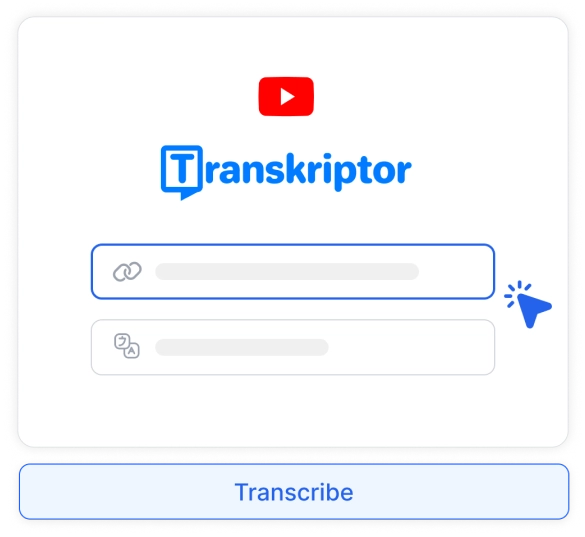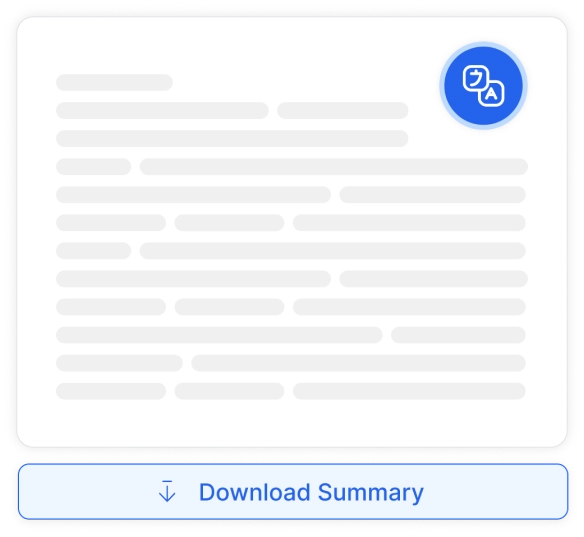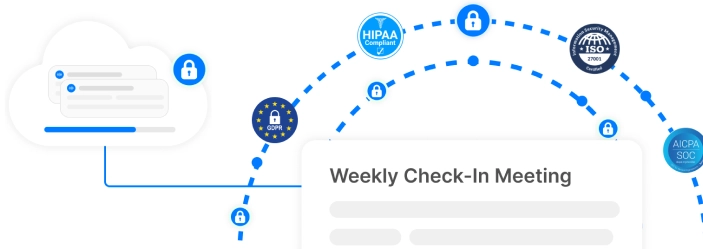Summarize YouTube Videos Online

Summarize YouTube videos in 100+ languages
How to Summarize a YouTube Video with Transkriptor

1. Paste YouTube Video Link
Paste the YouTube link into the box and select the video language.

2. Generate Video Summary
Transkriptor delivers results fast and with 99% accuracy. Only wait for a few seconds.

3. Translate and Download Summaries
Once the summary is finished, you can download your YouTube video transcription and summary.
Why Choose Transkriptor for YouTube Video Summaries?

AI-Powered Quick Summaries
Quick Summaries: Generate concise, easy-to-read summaries of long videos in a snap.

99% Accurate Transcriptions
Accurate Transcriptions: Experience up to 99% accurate transcripts, even for lengthy or complex videos.

100+ Language Flexibility
Language Flexibility: Supports summarization in over 100 languages, enhancing accessibility.

Time Stamped Highlights
Time Stamped Highlights: Easily navigate to key moments in the video with precise timestamps.

Enhanced Data Privacy
Data Privacy: We prioritize your privacy with no storage of video links or data.
Record in Minutes, Transcribe in Seconds
Content Creators
Boost SEO by turning video content into accurate transcripts for search engines.
Language Learners
Improve learning by reading through summaries and transcripts in any language.
Professionals and Businesses
Quickly analyze content from long webinars, tutorials, or conferences to extract insights.
Student and Educators
Summarize tutorials and lectures for more effective study and lesson planning.
Hearing Impaired Individiuals
Provide easily accessible written content through transcripts and summaries.
Hear it From Our Users
Transkriptor saved me so much time! I used it to summarize a long webinar, and the summary was spot on. The timestamps make it easy to jump to key parts, and it even worked flawlessly in Spanish! Perfect tool for busy professionals 👍.

Elena W.
Marketing Specialist
I use Transkriptor to transcribe and summarize YouTube videos in different languages for my studies. The accuracy is impressive, even with complex topics. I love that it supports so many languages. This has been a game-changer for my learning routine!

Jamal A.
Language Student
Transkriptor makes it super easy to turn long lectures into clear summaries. I transcribe my own lectures for students, and they love it. The interface is straightforward, and the privacy features give me peace of mind. Definitely a valuable tool for educators.

Katerina S.
University Lecturer
I create a lot of video content, and Transkriptor helps me quickly turn those videos into written summaries for SEO. It's fast, accurate, and easy to use. Plus, the privacy features are a big plus! Highly recommend for creators looking to repurpose their content efficiently.

Raj M.
Content Creator
4.6/5
Rated 4.6/5 based on 16k+ reviews on Google Play Store
4.8/5
Rated 4.8/5 based on 1.2k+ reviews on Google Chrome Web Store
4.8/5
Rated 4.8/5 based on 450+ reviews on App Store
Frequently Asked Questions
A YouTube summarizer is a tool that uses AI to generate a concise summary and transcript from a YouTube video, saving you time and effort.
Simply paste the YouTube link, choose your language, and our AI provides an instant summary and transcript with up to 99% accuracy.
Yes, once the summary is generated, you can download it as a text file for future reference.
Our tool supports summarization and transcription in over 100 languages, making it accessible for users around the globe.
Transkriptor’s YouTube video summaries are up to 99% accurate, depending on the audio quality of the video.